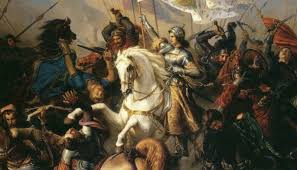
Joan was not even twenty years old when she was burned at the stake. Every nation has a mythical figure. But there is not the slightest doubt that the myth, the mystery, the symbol of France is Joan, improperly called Joan of Arc. She was not consecrated after death, but in life, because she was a living myth.
She was a prophetess: all, friends and enemies, French and English, believed it: she inherited the great prophetic tradition of the Old Testament, Judith, Esther, Deborah: the angels of the crown protected her with their coloured wings, together with the Virgin Mary.

Joan performed miracles and through them won battles, alone, with the apparent help of the French army. She listened to voices - among which was that of John the Baptist; and especially that of Jesus Christ, with whom, like Saint Francis, she identified herself.
Joan’s enemies were many: first of all the English, who tried to buy her. Among the French enemies, the city of Paris and the party of the Burgundians: the university scholars who despised her innocence, and judged her a witch: one of the countless witches who lit the fantasy of the Middle Ages. They accused her of being a blasphemer - her, the pure, the innocent.

We can reconstruct the few years of her life: not even twenty. The birth is almost unknown, like that of Christ. She was born in January 1412 in a small village in Lorraine. Where Giovanna is, there was no noise, no performance: but a miraculous silence, crossed only by the mysterious voices that visited her.
She was poor - as her followers said - like all the people chosen by God. At the beginning of 1429, without giving any explanation, Giovanna left the family.
Who, then, was Giovanna? The "Pastora" is defined, as in the Old Testament. Soon the Shepherdess became the Maiden, the name that Joan preferred.
The "Shepherdess Maid" was a virgin: a sealed, impenetrable body, to which only the mysterious Voices had access. Never, never, absolutely, defined herself as the daughter of God: it would have been a lie, an exaggeration, a falsification, a blasphemy.
King Charles II had her armed. Joan rode on and brandished the spear better than a man. It was the vexilliphere that rejected enemies and confounded the proud, and it resembled the Christ of Revelation.
She was not cultured: she did not know Latin, nor write: she only knew the daily liturgy and chivalric novels. Every once in a while she used to pronounce, or dictate, memorable words. It is not known how, by the influence of God or angels or voices, at the age of twenty she had the talent of a great warrior. She cut off her hair, took on a man’s face and clothes.

She had become a warrior. She met the king and his generals, and soon became the commander-in-chief of the French army. She pursued great goals: driving the British out of France, turning the king into the emperor of Christianity, reconquering the Holy Land, and finally creating a perfect kingdom, at least a thousand years long.
In this kingdom, no one blasphemed: the poor were protected, and at the last, she would die. For this very reason - Joan thought - she defeated the English. The new world was approaching. But the few months that the angels had granted her, were now at the end.
On the morning of 7 May 1429, Joan was wounded by an arrow: an enemy archer hit her on the red velvet hood and knocked her off her horse. She was taken prisoner and locked in a castle. The University of Paris judged her perverse and heretical. She was handed over to the British. She tried in vain to kill himself, jumping from the top of the castle of Beaurevoir: perhaps attempt to escape, perhaps of suicide. She was accused of committing crimes and crimes.
France, which had so loved her, abandoned her. For the girl almost twenty, for the Shepherdess, for the Maid, everything was gone. At the end of May 1431, condemned as a witch, wearing male clothes again, she was burned alive on the square of Rouen. In England the news was completely ignored: only Shakespeare spoke of her in Henry VI.
The myth of Joan of Arc has managed to cross the centuries with films, legends and books. We find the story of his character in the book "A History of France" by John Julius Norwich where not only her story is told but also that of other characters who have made the history of France.

The book is available in the book catalogue or by clicking directly on this link: https://www.quaybooksstore.com/products/a-history-of-france-by-john-julius-norwich?_pos=1&_sid=213231356&_ss=r
Read the original article here: https://rep.repubblica.it/pwa/robinson/2020/08/20/news/la_liberta_senza_tempo_di_giovanna-265080526/




xTkAWdHcZ
BxOeDWzp
LQzWanUbtpDMhIJ
pWqYDVGAvrNwF
Leave a comment